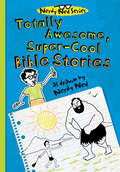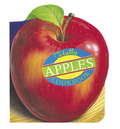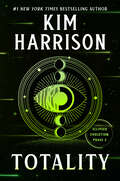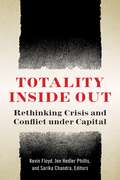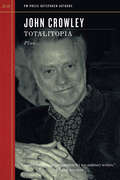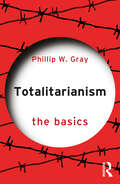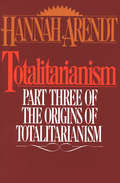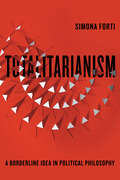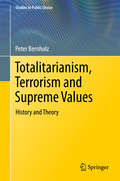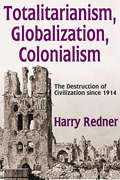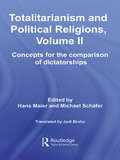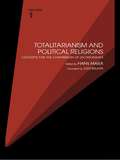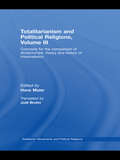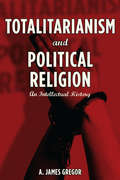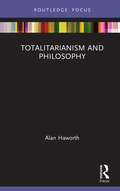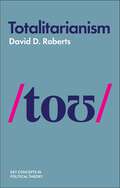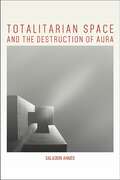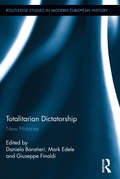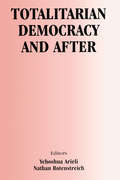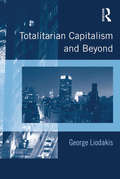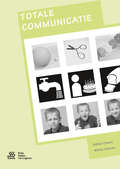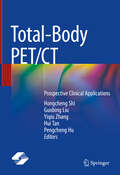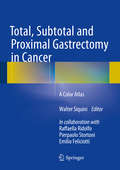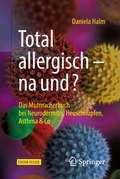- Table View
- List View
Totally Awesome, Super-Cool Bible Stories as Drawn by Nerdy Ned
by Corey AdamsJoin Ned as he draws--and learns--his way through the Bible! Combining International Children's Bible® text with funny illustrations, this Bible storybook brings to life the most popular Bible stories with a humorous but respectful twist. Our narrator Ned will guide late elementary and middle-grade kids through the Bible--keeping them smiling the entire time. Even reluctant readers will engage with the Bible stories and come away with newfound Bible knowledge and clarity. These funny sketches will grab kids' attention--and keep it--as they see their favorite Bible stories relate to their lives in a whole new way!Meets national education standards.
Totally Apples Cookbook
by Helene Siegel Karen GillinghamThis handy pocket-size cookbook is chock-full of apple recipes - from mouthwatering desserts like Apple Crisp to savory dishes like Curried Apple Soup. Apples are the key to classic compotes, chutneys, glazes, and other homemade snacks and desserts, but also add flavor to salads, slaws, soups, and main entrees in this apple-centric guide sure to delight the palate.From the Trade Paperback edition.
Totality: Eclipsed Evolution: Phase 2
by Kim HarrisonAfter a solar eclipse opens a way between our world and a paranormal realm, and the dark side of first contact emerges, one woman&’s loyalties will be tested in this gripping serialized adventure from the #1 New York Times bestselling author of the Hollows series.Dr. Renee Caisson never expected that her scientific expertise would lead to a role playing interpreter between humans and the demonic-looking Neighbors. When the door between their worlds opened, she was drafted by the government to study the otherworldly beings and was able to prove her theory: the Neighbors had been to Earth before—and now they simply wanted to save their dying planet.At least, that&’s the story, and everyone—both human and Neighbor—is sticking to it. The Neighbor in charge of the new portal&’s operation, Noel, isn&’t that sure anymore. Having succeeded in finding a new planet to inhabit, the leaders of her world have made the dark truth of their existence clear to her: the Neighbors forcibly tried to make a foothold on Earth in the past—and they can&’t afford to fail again.But the Neighbors&’ ability to magically teleport from place to place has convinced Major Jackson that the only way to keep control of the situation is to embrace it and tell the world of the Neighbors&’ existence.Unfortunately, not everyone agrees.
Totality Inside Out: Rethinking Crisis and Conflict under Capital
by Kevin Floyd, Jen Hedler Phillis, and Sarika ChandraHowever divergent their analyses may be in other ways, some prominent anti-capitalist critics have remained critical of contemporary debates over reparative justice for groups historically oppressed and marginalized on the basis of race, gender, sexual identity, sexual preference, and/or ability, arguing that the most these struggles can hope to produce is a more diversity-friendly capital. Meanwhile, scholars of gender and sexuality as well as race and ethnic studies maintain that, by elevating the socioeconomic above other logics of domination, anti-capitalist thought fails to acknowledge specific forms and experiences of subjugation.The thinkers and activists who appear in Totality Inside Out reject this divisive logic altogether. Instead, they aim for a more expansive analysis of our contemporary moment to uncover connected sites of political struggle over racial and economic justice, materialist feminist and queer critique, climate change, and aesthetic value. The re-imagined account of capitalist totality that appears in this volume illuminates the material interlinkages between discrepant social phenomena, forms of oppression, and group histories, offering multiple entry points for readers who are interested in exploring how capitalism shapes integral relations within the social whole.Contributors: Brent Ryan Bellamy, Sarah Brouillette, Sarika Chandra, Chris Chen,Joshua Clover, Tim Kreiner, Arthur Scarritt, Zoe Sutherland, Marina Vishmidt
Totalitopia (Outspoken Authors)
by John CrowleyJohn Crowley's all-new essay "Totalitopia" is a wry how-to guide for building utopias out of the leftovers of modern science fiction. "This Is Our Town," written especially for this volume, is a warm, witty, and wonderfully moving story. One of Crowley's hard-to-find masterpieces, "Gone" is a Kafkaesque science fiction adventure about an alien invasion. Plus: There's a bibliography, an author bio, and of course an Outspoken Interview, the usual cage fight between candor and common sense.
Totalitarianism: The Basics (The Basics)
by Phillip W. GrayTotalitarianism: The Basics is an easy-to-read introduction into the main concepts, ideologies, and regimes associated with totalitarianism. Starting with an overview of how scholars have attempted to define totalitarianism, Phillip W. Gray begins with an examination of the various types of terms used, helping the reader think about how these terms do – and do not – apply to different ideologies and governments. Easily accessible language and the use of numerous examples aid readers in seeing the connections between certain types of ideologies and some forms of organization/movements in their relation to historically well-known totalitarian regimes. Gray concludes with the tools necessary to think through how to distinguish between an actual (or potential) totalitarian system and regimes that, while oppressive or authoritarian, would not be totalitarian in nature. A rich bibliography containing additional readings bookend the text. Totalitarianism: The Basics offers an essential introduction for students from all backgrounds seeking to understand totalitarianism and for general readers with an interest in political ideologies and extremism. For those knowledgeable in this field, it adds conceptual relevance and a variety of ways of thinking about the term.
Totalitarianism: Part Three of The Origins of Totalitarianism (Origins Of Totalitarianism Ser.)
by Hannah ArendtThe great twentieth-century political philosopher examines how Hitler and Stalin gained and maintained power, and the nature of totalitarian states. In the final volume of her classic work The Origins of Totalitarianism, Hannah Arendt focuses on the two genuine forms of the totalitarian state in modern history: the dictatorships of Bolshevism after 1930 and of National Socialism after 1938. Identifying terror as the very essence of this form of government, she discusses the transformation of classes into masses and the use of propaganda in dealing with the nontotalitarian world—and in her brilliant concluding chapter, she analyzes the nature of isolation and loneliness as preconditions for total domination. &“The most original and profound—therefore the most valuable—political theoretician of our times.&” —Dwight Macdonald, The New Leader
Totalitarianism: A Borderline Idea in Political Philosophy (Square One: First-Order Questions in the Humanities)
by Simona FortiIn the last decade, we have witnessed the return of one of the most controversial terms in the political lexicon: totalitarianism. What are we talking about when we define a totalitarian political and social situation? When did we start using the word as both adjective and noun? And, what totalitarian ghosts haunt the present? Philosopher Simona Forti seeks to answer these questions by reconstructing not only the genealogy of the concept, but also by clarifying its motives, misunderstandings, and the controversies that have animated its current resurgence. Taking into account political theories and historical discussions, Totalitarianism especially focuses on philosophical reflections, from the question of totalitarian biopolitics to the alleged totalitarian drifts of neoliberalism. The work invites the relentless formulation of a radical question about the democratic age: the possibilities it has opened up, the voids it leaves behind, the mechanisms it activates, and the "voluntary servitude" it produces. Forti argues that totalitarianism cannot be considered an external threat to democracy, but rather as one of the possible answers to those questions posed by modernity which democracies have not been able to solve. Her investigation of the uses and abuses of totalitarianism as one of the fundamental categories of the twentieth and twenty-first centuries promises to provoke much-needed discussion and debate among those in philosophy, politics, ethics, and beyond.
Totalitarianism, Terrorism and Supreme Values
by Peter BernholzApplying a rational choice perspective, this book presents a dynamic theory of the evolution of totalitarian regimes and terrorism. By demonstrating that totalitarian regimes rest on ideologies involving supreme values that are assumed to be absolutely true, the author identifies the factors that lead to totalitarian regimes, and those that transform or abolish those regimes with time. The author addresses different ideologies, such as National Socialism, Communism, and religious movements; examines numerous historical cases of totalitarian regimes; and develops a formal, mathematical model of totalitarianism in the book's closing chapter.
Totalitarianism, Globalization, Colonialism: The Destruction of Civilization Since 1914
by Harry RednerThe century that began in 1914 with the outbreak of the First World War was catastrophic. Over the course of that one-hundred-year span, civilizations were destroyed in the Old World, the New World, and the Third World, the latter represented by China, India, and Islam.In Europe the main agent of destruction was totalitarianism; in America it was globalization, ushered in by modernity; and in the non-Western world it was colonialism, followed later by totalitarianism and globalization. Harry Redner examines each of these processes, providing theoretical and historical accounts of their emergence. He considers the effects of Nazism and Bolshevism on the morale and morals of Europe; studies the effects on the United States of the nation's emergence as a major world power; and describes the impact of modernization on China, India, and Islam as they underwent Europeanization, Sovietization, and Americanization.Redner confronts us with a paradox: in the midst of unprecedented material affluence and organizational efficiency, one that uses advanced technologies and cutting-edge scientific knowledge, we are also sinking into an unprecedented cultural, moral, intellectual, and spiritual decline. He locates the origins of this condition in the violently contradictory processes of the twentieth century.
Totalitarianism and Political Religions, Volume II: Concepts for the Comparison Of Dictatorships (Totalitarianism Movements and Political Religions)
by Michael Schäfer Hans MaierAvailable for the first time in English language translation, this is the long-awaited second volume of the three part set on Totalitarianism and Political Religions, edited by the eminent Professor Hans Maier. This represents a major study, with contributions from leading scholars of political extremism, sociology and modern history, the book shows how new models for understanding political history arose from the experience of modern despotic regimes. We are used to distinguishing the despotic regimes of the twentieth century - Communism, Fascism, National Socialism, Maoism - very precisely according to place and time, origins and influences. But what should we call that which they have in common? On this question, there has been, and still is, a passionate debate. Indeed, the question seemed for a long time not even to be admissible. Clearly this state of affairs is unsatisfactory. The debate has been renewed in the past few years. After the collapse of the communist systems in Central, East and Southern Europe, a (scarcely surveyable) mass of archival material has become available. Following the lead of Fascism and National Socialism, communist and socialist regimes throughout the world now belong to the historical past as well. This leads to the resumption of old questions: what place do modern despotisms assume in the history of the twentieth century? What is their relation to one another? Should they be captured using traditional concepts – autocracy, tyranny, despotism, dictatorship – or are new concepts required? Here, the most important concepts - totalitarianism and political religions - are discussed and tested in terms of their usefulness. This set of volumes is as topical and relevant to current world events in the twenty first century.
Totalitarianism and Political Religions, Volume 1: Concepts for the Comparison of Dictatorships (Totalitarianism Movements and Political Religions #Vol. 1)
by Hans MaierWe are used to distinguishing the despotic regimes of the 20th century - communism, fascism, National Socialism, Maoism - very precisely according to place and time, origins and influences. But what should we call that which they have in common? On this question, there has been and is still a passionate debate.This book documents the first international conference on this theme, a conference that took place in September of 1994 at the University of Munich. The book shows how new models for understanding political history arose from the experience of modern despotic regimes. Here, the most important concepts - totalitarianism and political religions - are discussed and tested in terms of their usefulness.
Totalitarianism and Political Religions Volume III: Concepts for the Comparison Of Dictatorships - Theory & History of Interpretations (Totalitarianism Movements and Political Religions)
by Hans MaierAvailable for the first time in English language translation, the third volume of Totalitarianism and Political Religions completes the set. It provides a comprehensive overview of key theories and theorists of totalitarianism and of political religions, from Hannah Arendt and Raymond Aron to Leo Strauss and Simone Weill. Edited by the eminent Professor Hans Maier, it represents a major study, examining how new models for understanding political history arose from the experience of modern despotic regimes. Where volumes one and two were concerned with questioning the common elements between twentieth century despotic regimes - Communism, Fascism, National Socialism, Maoism – this volume draws a general balance. It brings together the findings of research undertaken during the decade 1992-2002 with the cooperation of leading philosophers, historians and social scientists for the Institute of Philosophy at the University of Munich. Following the demise of Italian Fascism (1943-45), German National Socialism (1945) and Soviet Communism (1989-91), a comparative approach to the three regimes is possible. A broad field of interpretation of the entire phenomenon of totalitarian and political religions opens up. This comprehensive study examines a vast topic which affects the political and historical landscape over the whole of the last century. Moreover, dictatorships and their motivations are still present in current affairs, today in the twenty-first century. The three volumes of Totalitarianism and Political Religions are a vital resource for scholars of fascism, Nazism, communism, totalitarianism, comparative politics and political theory.
Totalitarianism and Political Religion: An Intellectual History
by Gregor A. JamesThe totalitarian systems that arose in the twentieth century presented themselves as secular. Yet, as A. James Gregor argues in this book, they themselves functioned as religions. He presents an intellectual history of the rise of these political religions, tracing a set of ideas that include belief that a certain text contains impeccable truths; notions of infallible, charismatic leadership; and the promise of human redemption through strict obedience, selfless sacrifice, total dedication, and unremitting labor. Gregor provides unique insight into the variants of Marxism, Fascism, and National Socialism that dominated our immediate past. He explores the seeds of totalitarianism as secular faith in the nineteenth-century ideologies of Ludwig Feuerbach, Moses Hess, Karl Marx, Friedrich Engels, Giuseppe Mazzini, and Richard Wagner. He follows the growth of those seeds as the twentieth century became host to Leninism and Stalinism, Italian Fascism, and German National Socialism-each a totalitarian institution and a political religion.
Totalitarianism and Philosophy (Routledge Focus on Philosophy)
by Alan HaworthWhen Mussolini, Hitler and Stalin first came to power in the 1930s, their regimes were considered by many to represent a new and perplexing phenomenon. They were labelled ‘totalitarian’. But is ‘totalitarianism’ genuinely new, or is the word just another name for something old and familiar, namely tyranny? This is the first question to be addressed by Alan Haworth in this book, which explores the relevance of philosophy to the understanding of totalitarianism. In the course of the discussion, definitions are tested. Is it coherent to think of totalitarianism as the imposition of a ‘total state’, or of ‘total control’? Could it even be that the idea of totalitarianism is a ‘non-concept’? Examining the work of the totalitarian philosophers Giovanni Gentile and Carl Schmitt, the idea of ‘totalitarianism by other means’ as represented in dystopian fiction, and the philosophy of Hannah Arendt, Totalitarianism and Philosophy is essential reading for all students and scholars of political philosophy.
Totalitarianism (Key Concepts in Political Theory)
by David D. RobertsLess than a century old, the concept of totalitarianism is one of the most controversial in political theory, with some proposing to abandon it altogether. In this accessible, wide-ranging introduction, David Roberts addresses the grounds for skepticism and shows that appropriately recast—as an aspiration and direction, rather than a system of domination—totalitarianism is essential for understanding the modern political universe. Surveying the career of the concept from the 1920s to today, Roberts shows how it might better be applied to the three ""classic"" regimes of Fascist Italy, Nazi Germany, and the Stalinist Soviet Union. Extending totalitarianism’s reach into the twenty-first century, he then examines how Communist China, Vladimir Putin's Russia, the Islamic Republic of Iran, the self-proclaimed Islamic State (IS), and the threat of the technological “surveillance state” can be conceptualized in the totalitarian tradition. Roberts shows that although the term has come to have overwhelmingly negative connotations, some have enthusiastically pursued a totalitarian direction—and not simply for power, control, or domination. This volume will be essential reading for any student, scholar or reader interested in how totalitarianism does, and could, shape our modern political world.
Totalitarian Space and the Destruction of Aura
by Saladdin AhmedWe live today within a system in which state and corporate power aim to render space flat, transparent, and uniform, for only then can it be truly controlled. The gaze of power and the commodity form are capable of infiltrating even the darkest of corners, and often, we invite them into our most private spaces. We do so as a matter of convenience, but also to placate ourselves and cope with the alienation inherent in our everyday lives. The resulting dominant space can best be termed totalitarian. It is space stripped of uniqueness, deprived of the "spatial aura" necessary for authentic experience. In Totalitarian Space and the Destruction of Aura, Saladdin Ahmed sets out to help us grasp what has been lost before no trace remains. He draws attention to that which we might prefer not to see, but despite the bleakness of this indictment of reality, the book also offers a message of hope. Namely, it is only once we comprehend the magnitude of the threat to our spatial experience and our own complicity in sustaining this system that we can begin to resist the totalizing forces at work.
Totalitarian Dictatorship: New Histories (Routledge Studies in Modern European History #19)
by Mark Edele Giuseppe Finaldi Daniela BaratieriThis volume takes a comparative approach, locating totalitarianism in the vastly complex web of fragmented pasts, diverse presents and differently envisaged futures to enhance our understanding of this fraught era in European history. It shows that no matter how often totalitarian societies spoke of and imagined their subjects as so many slates to be wiped clean and re-written on, older identities, familial loyalties and the enormous resilience of the individual (or groups of individuals) meant that the almost impossible demands of their regimes needed to be constantly transformed, limited and recast.
Totalitarian Democracy and After (Totalitarianism Movements and Political Religions)
by Yehoshua Arieli Nathan RotenstreichThis volume, first published in 1984, contains the principal papers from a distinguished colloquium held in 1982. Its avowed purpose is to investigate further the notion of "totalitarian democracy" and to look at its repercussions in the contemporary world.
Totalitarian Capitalism and Beyond
by George LiodakisAnchored in contemporary debates on capitalism and political economy, this study reconsiders the major trends which are currently shaping a new stage of capitalism. With chapters examining globalization, the role of technology and environmental degradation, George Liodakis constructs a politico-economic approach on contemporary capitalism from within a classical Marxist framework of political economy. The volume provides a fitting balance between theory and empirical evidence and significantly enriches the existing scholarship on contemporary capitalism and the potential for social change. This is an important contribution to those interested in international political economy, in particular with developing a new political strategy for going beyond capitalism: a 'reinvention' of a communist perspective.
Totale communicatie
by Esther Oskam Wilma ScheresEen boek over het communiceren met mensen met een verstandelijke en/of communicatieve handicap via Totale Communicatie. Dit is een manier van communiceren waarbij de omgeving zich aanpast aan het communicatieniveau, de mogelijkheden van de cliënt. Gebruik wordt gemaakt van zowel gebarentaal als van gesproken taal. Het boek is voor hulpverleners, begeleiders en ouders die zich willen verdiepen in Totale Communicatie. Het boek beschrijft de 'Weerklankmethodiek', dit is een methodiek om de mogelijkheden voor communicatie van de cliënt in kaart te brengen en voor de cliënt een programma van communicatie op maat te ontwikkelen. Er wordt beschreven hoe met allerlei communicatiemiddelen gewerkt kan worden zoals een klok, een levensboek en diverse communicatieborden. Het boek bevat ook een gebarencursus die gaat over basisgebaren die een rol spelen bij het dagelijkse leven. De auteurs zijn orthopedagoog/psycholoog en werken bij de Koninklijke Effatha Guyot Groep. In de tweede druk (2005) werden nieuwe ontwikkelingen en inzichten verwerkt; daarvan is dit een ongewijzigde druk.
TotalEnergies' Investment in Hyzon Motors
by David Lane Vikram GandhiIn November 2021, Girish Nadkarni, the head of TotalEnergies' corporate venture capital arm (TEV) was considering whether, and on what terms, to exit an investment in Hyzon Motors, a start-up supplier of hydrogen-powered trucks. TEV had invested $4 million in Hyzon, which had gone public in July 2021 with a $2.7 billion valuation. Nadkarni was now eager to take TEV's gains, but recognized the potential harm that selling TEV's Hyzon shares could cause. Market observers might interpret TEV's exit not as profit-taking but as an early investor's lack of confidence in Hyzon's prospects. Further, TotalEnergies had signed an MOU with Hyzon to bring 80 trucks to Europe-the goal was to demonstrate for its truck fleet customers the viability of hydrogen as a viable replacement fuel for the diesel it already supplied. Selling the Hyzon shares might convey the opposite message.
Total-Body PET/CT: Prospective Clinical Applications
by Hongcheng Shi Guobing Liu Yiqiu Zhang Hui Tan Pengcheng HuThis book systemically introduces physical properties and clinical applications of total-body PET/CT. Firstly, based on the results of a comparative study between total-body PET/CT and conventional digital PET/CT, the feasibility and diagnostic efficacy of rapid scanning are overviewed. Following chapters present the unique value of total-body PET/CT dynamic acquisition in pharmacokinetic research and its potential advantages, feasibility and optimized imaging of half-dose and one-tenth-dose total-body PET/CT scans. In addition, new technologies that are still being explored and perfected, such as gating technology and ultra-low dose CT are also included. It will be a useful reference for nuclear medicine physicians and radiologists who are interested in total body PET/CT.
Total, Subtotal and Proximal Gastrectomy in Cancer
by Walter SiquiniThis richly illustrated volume describes the performance of total and subtotal gastrectomy with extended D2 lymphadenectomy by providing a detailed step-by-step guide to both manual and mechanical procedures. Gastric cancer is the fourth most commonly occurring cancer and the second most common cancer-related cause of death worldwide, and surgery remains the only potentially curative treatment. Although several aspects of surgical management are still controversial, all guidelines for the treatment of curable gastric cancer recommend subtotal gastrectomy (for tumors located in the antrum and corpus) or total gastrectomy (for tumors located in the fundus) with extended D2 lymphadenectomy. Various technical tips and secrets are revealed that serve to simplify the procedure and simultaneously make it more effective: by rendering esophagojejunal and gastrojejunal anastomosis more secure, the risk of leakage is minimized. High-quality intraoperative color photographs and drawings covering all steps facilitate understanding of these complex operations and will prove an invaluable tool for surgeons, residents and professionals in the field.
Total allergisch - na und?: Das Mutmacherbuch bei Neurodermitis, Heuschnupfen, Asthma & Co
by Daniela HalmJuckreiz, Niesattacken, Atemnot – wer allergisch ist, kennt diese Symptome und auch den Frust, dass es schon wieder losgeht, mit dem Heuschnupfen, mit einem Neurodermitisschub oder einer allergischen Reaktion auf Lebensmittel. Dabei gibt es viele Tipps und Tricks für den Alltag, um Allergien in den Griff zu bekommen. Auch Herausforderungen wie ein Kindergeburtstag, ein Schulausflug oder eine Urlaubsreise lassen sich mit guter Vorbereitung meistern. Das Miteinander ist ebenfalls Thema des Buchs: Wie gehe ich mit Belastungen oder mit unsensiblen Kommentaren anderer um? Sicher ist: Man steht nicht alleine da, es gibt Hilfe!Die Medizinjournalistin Daniela Halm ist selbst Mutter einer Tochter mit verschiedenen Allergien und kennt beides: persönliche Erfahrungen im Umgang mit der Erkrankung, aber auch die medizinischen Fakten rund um Allergien und was Patienten in Zukunft helfen könnte. Mit diesem Buch will sie vor allem Kindern und Jugendlichen mit Allergien und ihren Familien Mut machen und ihnen mit praktischen Tipps das Leben erleichtern. Eine spannende Reise durch die Welt der Allergie, nicht nur informativ, sondern auch mit einem Augenzwinkern erzählt.Empfehlung des Deutschen Allergie- und Asthmabunds: "Aus Sicht des DAAB schließt das Buch "Total allergisch - na und?" von Frau Halm eine Lücke auf dem deutschen Bücher- und Ratgebermarkt. Die Kombination aus praktischen Tipps, gut verständlich dargestelltem Stand der Wissenschaft und eigenen Erfahrungen und Erlebnissen aus dem Alltag einer Familie, die von Allergien, Asthma und Neurodermitis betroffen ist, macht die Besonderheit des Buches aus. Es ist dadurch ein hilfreicher Begleiter nicht nur für Betroffene selber, sondern auch für Fachpersonal, das mit allergischen Patienten zu tun hat.“
